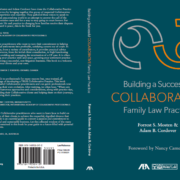Collaborative Divorce: Maintaining A Safe Environment
As a collaborative lawyer, it is my obligation to provide a safe environment for my client, the family, and the collaborative team. This obligation is not only to provide physical safety, but also the safety of the principles of collaborative practice.

Collaborative Divorce Texas (formerly known as the Collaborative Law Institute of Texas), a leading organization in the field of collaborative practice, created Protocols of Practice for Collaborative Lawyers. Below you will find the Comment to Section 5.06: Safe Environment.
The collaborative lawyer acknowledges that a safe environment necessarily involves the following principles:
1. Refraining from insistence on acceptance of conditions precedent to entering into the collaborative law process.
2. Encouraging creative problem-solving and discouraging positional bargaining.
3. Speaking directly with participants about any perceived non-collaborative behavior and attempting to remedy same in a constructive manner.
4. Using non-defensive methods of hearing criticism.
5. Exercising patience at all times.
6. Avoiding the use of pressure, threats, or deadlines.
7. Acknowledging the process can only progress at the pace of the slowest participant.
8. Avoiding offensive or provocative conduct, such as cross-examination, and promptly reminding each other that such behavior is destructive to the process.
9. Avoiding assessment of blame and use of judgmental language.
10. Avoiding surprises.
11. Adhering to agendas.
12. Avoiding unilateral actions.
13. Avoiding unsolicited legal opinions in the joint meeting.
14. Encouraging the joint engagement of allied professionals, including financial professionals, mental health professionals, mediators, clergy, and other for assistance in resolution.
15. Urging use of language that encourages the speaker to speak in the first person (I feel, I believe, etc.) and avoiding speech in the second person (you know, you failed, you always, you never, etc.).
16. Training nonlawyer employees to be knowledgeable about these protocols.
Adam B. Cordover is a collaborative trainer and co-author of an upcoming American Bar Association book on Building A Successful Collaborative Law Practice. Adam is a leader in the international collaborative movement and one of the most experienced collaborative attorneys in Tampa Bay.





